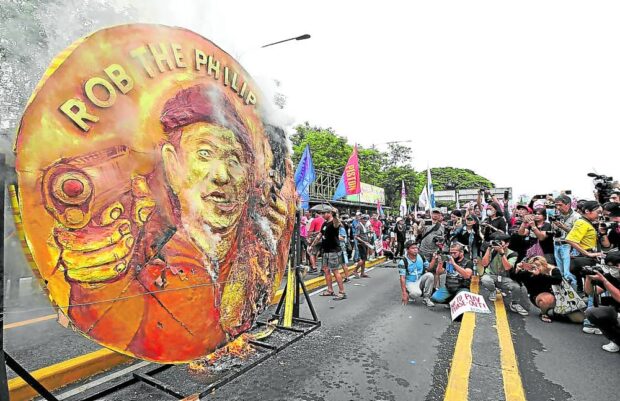
FIERY RALLY Protesters prepare to burn the effigy of President Marcos on Commonwealth Avenue ahead of his State of the Nation Address last July. —LYN RILLON
Bagong Alyansang Makabayan (Bayan) president Renato Reyes Jr. and resident artist Max Santiago on Friday asked the Quezon City prosecutors to junk a criminal complaint against them in connection with the burning of President Marcos’ effigy during a State of the Nation Address (Sona) protest in July.
In their 18-page joint counteraffidavit, Reyes and Santiago claimed that the charges wre baseless and part of a growing trend to criminalize freedom of expression.
“I did not burn ‘waste.’ I created an artwork that embodied my political convictions and those of the fellow artist/activists who took part in crafting the effigy, ‘Doble Kara,’ a main visual element of the 2023 People’s State of the Nation Address,” the affidavit read.
“We assert that the action during Sona is part of protected free speech and should not be criminalized,” it said.
The complaint, lodged by Quezon City Police District (QCPD) Police Staff Sergeant Mario Sembrano and Police Cpl. Paolo Navarro, tagged Reyes, along with Santiago, the artist responsible for the effigy, and three unidentified individuals.
‘Air pollution’
It alleged that the burning of the effigy by Reyes and Santiago “greatly contributed to air pollution, which grossly contradicts the government program in ensuring the protection of public health and the environment.”
Lawyers from the Movement Against Disinformation, led by former Ateneo School of Government Dean Tony La Viña, called the charges filed against Bayan a “waste of time.” He said Bayan’s effigy burning did not create pollution.
“It has a chilling effect on other forms of protests … People will hesitate to create art critical of the administration,” Santiago told reporters.
According to the respondents, the complaint from QCPD cites nonexistent provisions under the Batas Pambansa Blg. 880, or the Public Assembly Act of 1985. Reyes and Santiago argued that the complaint failed to provide important details, such as the time and place of the alleged burning, crucial for jurisdictional purposes.
‘A harassment suit’
Reyes dismissed the complaint as a “harassment suit,” emphasizing that he was in Belgium during the rally even as he asked the QCPD to provide evidence of his presence. He pointed out that his name was only handwritten on the complaint’s cover page. He vowed to file a complaint against the policemen involved.
Reyes defended the burning effigies as protected free speech, dismissing a complaint filed against him as a retaliation for exposing alleged police harassment of their members. He claimed the complaint was recycled from an earlier case and suggested that the former QCPD chief was involved.
In addition to the defenses, Reyes and Santiago emphasized the issue of free speech. The affidavit argues, “[T]he right to freedom of expression must prevail over the right of the government to trample upon such right in the guise of maintaining peace and order through the exercise of its police power.”

